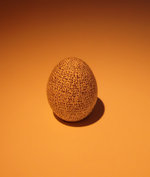Genesis 1:2
| Genesis 1:2 | |
|---|---|
← 1:1 1:3 → | |
 Depiction of Genesis 1:2 by Wenceslaus Hollar. | |
| Book | Book of Genesis |
| Hebrew Bible part | Torah |
| Order in the Hebrew part | 1 |
| Christian Bible part | Old Testament |
| Order in the Christian part | 1 |
Genesis 1:2 is the second
Hebrew
- וְהָאָרֶץ הָיְתָה תֹהוּ וָבֹהוּ וְחֹשֶׁךְ עַל פְּנֵי תְהוֹם וְרוּחַ אֱלֹהִים מְרַחֶפֶת עַל פְּנֵי הַמָּיִם
Transliteration:
- Veha’aretz hayeta tohu vaḇohu vechoshekh ‘al-pene tehom veruach Elohim merachephet ‘al-pene hammayim.[1]
- Ve: "and"
- ha’aretz: "the earth"
- hayeta: "was", pa'al construction past tense third person feminine singular
- tohu vaḇohu: difficult to translate, but often rendered as "formless and void"
- vechoshekh: "and darkness"
- ‘al-pene: "[was] over [the] face", pənê being a plural construct state of the Hebrew word for face
- tehom: a mythological or cosmological concept often translated as "the Deep"
- veruach: "and [the] ruach", a difficult term translated as "spirit" or "wind"
- Elohim: the generic Hebrew term for God or gods
- merachephet: often translated as "hovered/was hovering" The word is ריחף (richeph) in pi'el participle form prefixed with one letter prefix "m-".
- ‘al-pene hammayim: "over [the] face of the waters"
Analysis
Genesis 1:2 presents an initial condition of creation - namely, that it is tohu wa-bohu, formless and void. This serves to introduce the rest of the chapter, which describes a process of forming and filling.[2] That is, on the first three days the heavens, the sky and the land is formed, and they are filled on days four to six by luminaries, birds and fish, and animals and man respectively.
Before God begins to create, the world is tohu wa-bohu (Hebrew: תֹהוּ וָבֹהוּ): the word tohu by itself means "emptiness, futility"; it is used to describe the desert wilderness. Bohu has no known meaning and was apparently coined to rhyme with and reinforce tohu.[3] It appears again in Jeremiah 4:23,[4] where Jeremiah warns Israel that rebellion against God will lead to the return of darkness and chaos, "as if the earth had been ‘uncreated’."[5] Tohu wa-bohu, chaos, is the condition that bara, ordering, remedies.[6]
Darkness and "Deep" (
The "Spirit of God" hovering over the waters in some translations of Genesis 1:2 comes from the Hebrew phrase ruach elohim, which has alternately been interpreted as a "great wind".[9][10] Victor P. Hamilton decides, somewhat tentatively, for "spirit of God" but notes that this does not necessarily refer to the "Holy Spirit" of Christian theology.[11] Rûach (רוּחַ) has the meanings "wind, spirit, breath," and elohim can mean "great" as well as "god". The ruach elohim which moves over the Deep may therefore mean the "wind/breath of God" (the storm-wind is God's breath in Psalms 18:15 and elsewhere, and the wind of God returns in the Flood story as the means by which God restores the earth), or God's "spirit", a concept which is somewhat vague in the Hebrew bible, or simply a great storm-wind.[10]
See also
- Book of Genesis
- Genesis 1:1
- Tohu wa-bohu
- Genesis 1:3
- Apollo 8 Genesis reading while in lunar orbit, December 24, 1968
References
Citations
- ^ a b Hebrew text analysis: Genesis 1:2. Biblehub.com
- ^ Carlson & Longman 2010, p. 109.
- ^ Alter 2004, p. 17: Alter represents this in English by alliteration: "welter and waste"
- ^ Jer. 4:23
- ^ Thompson 1980, p. 230.
- ^ a b Walton 2017, p. 158.
- ^ Wenham 2003, p. 29.
- ^ Dumbrell 2002, p. 14.
- ^ See: Darshan, Guy, “Ruaḥ ’Elohim in Genesis 1:2 in Light of Phoenician Cosmogonies: A Tradition’s History,” Journal of Northwest Semitic Languages 45,2 (2019), 51–78.
- ^ a b Blenkinsopp 2011, pp. 33–34.
- ^ Hamilton 1990.
Bibliography
- ISBN 9780393019551.
- Blenkinsopp, Joseph (2011). Creation, Un-Creation, Re-Creation: A Discursive Commentary on Genesis 1-11. T&T Clarke International. pp. 33–34. ISBN 9780567372871.
- Carlson, Richard F.; ISBN 9780830838899.
- Baker Academic. p. 14.
- ISBN 0-8028-2521-4.
- ISBN 978-1467423038.
- ISBN 978-1850752080.
- ISBN 978-0310866206.
- ISBN 978-0830824618.
- ISBN 978-0830890071.
- ISBN 978-0281054299.
Further reading
- Jewish Publication Society. The Torah: The Five Books of Moses (3rd ed). Philadelphia: 1999.
- Darshan, Guy, “Ruaḥ ’Elohim in Genesis 1:2 in Light of Phoenician Cosmogonies: A Tradition’s History,” Journal of Northwest Semitic Languages 45,2 (2019), 51–78.
External links
- "Genesis 1:2." Online Parallel Bible.

